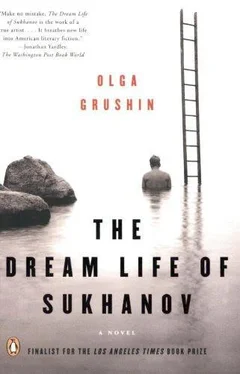“It’s a paperweight. Made of Venetian glass,” the kind voice said above me. The old man, unnoticed, had risen from his armchair. “A little trinket from a trip I made when I was young. You can take it if you like.”
It felt cold and smooth to the touch, and when I lifted it to the lamp, the light filled it with an enchanting, flickering, rosy glow, like that of a distant fire. Then I thought of the narrowing eyes of Sashka Morozov and, hastily shaking my head, set the weight down, on top of a stack of pages.
“Is this the book you are writing?” I asked sullenly, to say something. “What is it about?”
“Ah, so you’ve heard about my book,” he said smiling. “Well, you see, it concerns the aesthetic principles of the Italian Renaissance…. But I suppose that doesn’t tell you very much. To put it simply, it’s about art—art and beauty. Do you like art, Tolya?”
I remembered a teacher who had once read us a snappy Mayakovsky rhyme about pineapples and quails, and how I had not known what it meant until she explained about the fat, overdressed men who had exploited the masses just so they could eat such delicacies and surround themselves with beautiful things. I thought also of the posters in my school—the red-and-black ones lining the hallways, with powerful youths who held enormous hammers in their hands and looked not unlike Anton Morozov, and the others hanging in the cafeteria, depicting nasty bugs and admonishing us to wash our hands before eating. The Professor’s glasses sparkled patiently as he waited for my reply.
“Beauty is for the bourgeois,” I said disdainfully
He smiled again, cheerlessly this time.
“You think so?” he said, and picked up the magazine with the gold-lettered cover, leafed through it, found the paragraph he sought, and read, aloud but in a quiet, thoughtful voice, as if talking to himself: “‘We believe that life without Beauty is impossible, that we must attain a free and brilliant art for our descendants, one that is illumined by the sun and induced by tireless search; we believe that we must preserve for them the Eternal values forged by many generations…. Art is eternal, for it is founded on that which cannot be rejected. Art is whole, for its single source is the soul. Art is free, for it is created by the free impulse of creation….’”
Not understanding, I stared at him with hostility. When a yawn came, I did not bother to suppress it as my mother had taught me. He glanced at me as if only now remembering my presence and, with a short, embarrassed laugh, set the magazine down.
“I apologize,” he said quickly. “I just wanted to hear these words spoken. Wonderful publication this was, The World of Art…. No matter. Before you go, Tolya, may I show you something? See if you think it’s beautiful.”
I might have refused, but without waiting for my reply, he had already pulled a tall volume off a shelf. He opened it at a bookmark, then laid it on the desk and carefully lifted the diaphanous sheet that covered the page. A whiff of mildew fleetingly brushed my cheek. This was to be my last coherent impression before I let my eyes fall to the page.
In anyone’s life there can be only a few such moments—moments when a long, ringing hush fills your hearing, the world stands still as if under a magic spell, and thoughts and feelings course freely through your being, traversing the whole of eternity in the duration of a minute, so that when time resumes and you return from whatever nameless, dazzling void you briefly inhabited, you find yourself changed, changed irrevocably, and from then on, whether you want it or not, your life flows in a different direction. This was such a moment for me. Had I been thirteen or fourteen, perhaps none of this would have happened—perhaps I would have looked obediently where the old man was pointing and, with the indiscriminate thrill of an adolescent, would have seen merely a picture of a naked woman who, in covering herself with her impossibly long tresses, still left enough exposed to attract a prurient gaze.
But I was only eight, and I did not see a naked woman. Instead I saw tender ripples of the palest silvery gray, and a green so lush, so full of golden hints it felt like trapped sunshine, and glowing, translucent whites, and the brightest coppery sheen, and a pink that was not pink at all but in truth had no name fitting enough to describe it, so pearly and iridescent it was, more precious than the inside spiral of a seashell—yes, I saw all the brilliant, deep, lucid colors that had visited me before in my dreams, now released for the first time and given the most perfect, most radiant form. Entranced, I watched, for a suspended, breathless span of my private eternity, as the shades and the textures flowed smoothly into one another, creating harmony, creating glory, creating beauty….
The old man was talking above my head about some man named Botticelli, some woman named Venus, some place named Florence. I heard nothing.
“Do you have any more you can show me?” I said when I could speak.
He fell silent and looked into my face, closer than before.
“Oh yes, plenty more,” he then said gently. “But tonight may not be… Oh dear, this watch can’t possibly be correct! Past four in the morning, is it really? Why don’t you come by again tomorrow, Tolya… er… at a slightly earlier time, perhaps?”
It was almost light when I finally fell asleep. The torments I was bound to suffer at the hands of the Morozov boys did not force themselves into my dreams even once—I dreamt instead of a glowing, bright-eyed goddess being born amidst a heavenly swirl of shapes and colors. The next morning, I woke up with a smile of absolute happiness upon my lips, knowing that a new, different life lay before me.
On Tuesday morning, Sukhanov woke up late and was surprised to find himself smiling; he must have had an especially pleasant dream. Casting around his memory for its fading shimmer, he emerged yawning into the hallway and was surprised again, even more pleasantly, by the delicious smell of fried onions zestfully seasoning the whole apartment. Thinking that his life without Valya’s culinary talents might turn out to be acceptable after all, he sleepily followed his nose into the kitchen—and upon entering, was shocked to see Dalevich bending over the stove, wearing Nina’s apron and flourishing a spatula.
“You’ve got to try this,” said Ksenya, speaking with her mouth full. “The best omelet I’ve had in my life!”
Conscious of the ridiculous figure he cut standing in a wide shaft of sunlight, dressed in polka-dot pajamas that betrayed the rotundity of his stomach, with an undulating weave of the sofa’s pattern printed across his cheek, Sukhanov announced that he was not really hungry (Nina’s eyebrows rose slightly), not to mention that he needed to return to work without further ado—and would Ksenya be so kind as to bring him some coffee when it was ready? Then, murmuring unintelligible apologies to Dalevich, he retreated, past his son’s door, which was still demonstratively shut, back to the study. By the time he established himself at his desk, the last traces of his blithe morning mood had melted away like a desert mirage, and a long caravan of tedious, unhappy thoughts plodded across his mind. There was the matter of the room that needed to be arranged for that nuisance of a relative, and Vasily, whose slippery gaze and scoffing remarks had started to trouble him in earnest, and of course, the problem at hand—this insufferable essay on Dali that had been foisted upon him with so little ceremony.
The essay, at least, was resolving itself, he concluded after reviewing the text from the previous day. He had begun his narrative with a providentially remembered anecdote, which, being not only amusing but also undeniably metaphorical, spared him the unpleasantness of resorting to such harsh words as, for instance, “abnormal.” Once, during an arranged breakfast with a prominent Soviet poet, Dalí had commented in passing on the stunning beauty of an atomic mushroom cloud rising in purple ripeness into the skies. Justifiably outraged by such lack of humanity, the Soviet celebrity, at a loss for a fitting repartee, promptly spat in Dalí’s coffee. The artist remained unruffled. “I’ve tasted coffee with cream and sugar, with milk and various liqueurs,” he observed thoughtfully, “but never before with spittle”—and savoring the moment, he slowly carried the cup to his mustachioed lips.
Читать дальше








![Theresa Cheung - The Dream Dictionary from A to Z [Revised edition] - The Ultimate A–Z to Interpret the Secrets of Your Dreams](/books/692092/theresa-cheung-the-dream-dictionary-from-a-to-z-r-thumb.webp)



